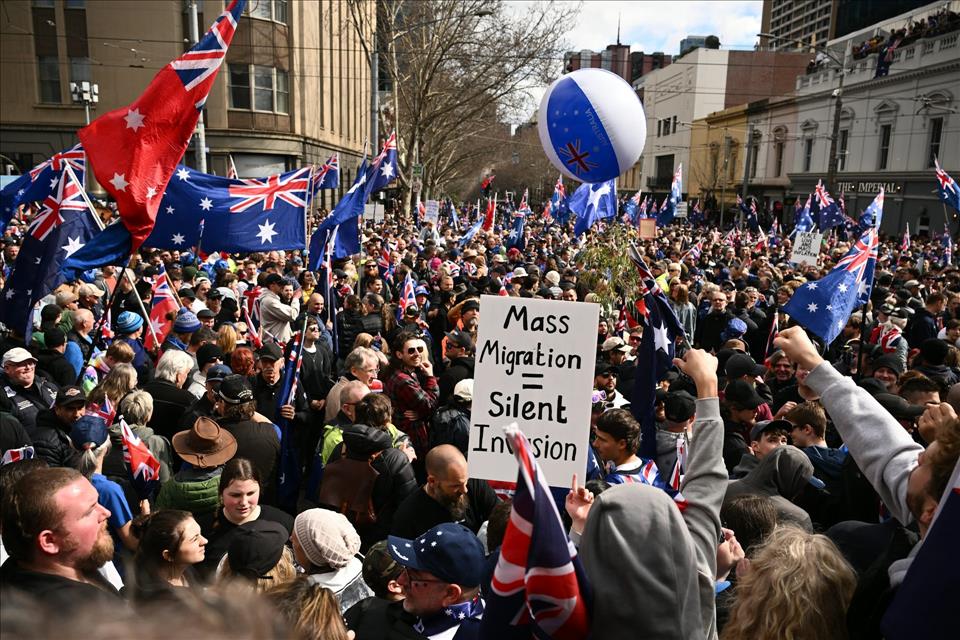Politicians Have Scapegoated Immigration For Decades. It's Time To Flip The Script
From John Howard's“we will decide who comes to this country” mantra , to Kevin Rudd's“if you come by boat you will never permanently live in Australia” in 2013 , through to Tony Abbott's“stop the boats” election victory that same year, it has been a prominent feature of Australia's recent political landscape.
For the Coalition, it was about stopping so-called“illegals”.
For Labor, it was framed as“saving lives at sea”.
For both, it was about keeping people seeking asylum out of contact with the Australian community, demonised and dehumanised, called by numbers, not names .
Against this backdrop, it's perhaps unsurprising Australians turned out in the thousands to rally against immigration this weekend. It could be seen as the culmination of years of MPs using immigration issues for short-term political gain .
But just as government messaging has partly contributed to this situation, it could also help get us out of it.
Not always 'sinister invaders'Political language about immigration wasn't always so negative.
At the end of the second world war, then-Prime Minister Ben Chifley welcomed 170,000 refugees and other displaced people from Europe.
In the 1970s, when the first boats of Vietnamese asylum seekers arrived in Australia's north, Prime Minister Malcolm Fraser insisted they be treated humanely and processed fairly.
As writer Thomas Keneally recalled :
And as former Immigration Minister Andrew Giles said in 2023:
'Real people, real families'The threatening thuggery on display at the weekend's anti-immigration marches has been rightly called out by Australian politicians on both sides.
In a change from her predecessor's hardline approach, Federal Opposition Leader Sussan Ley said while“strong borders keep us safe, they also allow us to be generous and compassionate to those fleeing conflict”.
Meanwhile, Home Affairs Minister Tony Burke reiterated“there is no place in our country for people who seek to divide and undermine our social cohesion”.
At the same time, we can't simply ignore concerns people have about the impact of immigration on housing, cost of living and infrastructure – much of which is based on misinformation which feeds a far-right agenda, according to Multicultural Affairs Minister Anne Aly.
When misinformation spreads, it impedes evidence-based decision-making and results in poor laws and policies.
The positive role of immigration is something the opposition's new immigration spokesman, Senator Paul Scarr, wants to stress .
He seems to be setting a new tone based on empathy, not division, drawing on his deep“respect and admiration” for migrant and refugee communities who are making“an outstanding contribution”.
When“we talk about immigration”, he says ,“we should never forget that we're actually talking about real people, real families”.
When Prime Minister Anthony Albanese came to office in 2022, he stressed the importance of a vision for Australia that promotes“unity and optimism, not fear and division”.
For the first time in a long while, there does seem to be bipartisan support for this approach.
Walking the walkThe dissonance, though, is that the broader architecture of Australia's asylum policies remains squarely in place. It's largely about deterrence, interception and offshoring.
And this week, parliament is expected to progress a bill that would facilitate the swift removal of around 350 non-citizens to Nauru.
In 2023, the High Court of Australia ruled it was unlawful to hold people in immigration detention indefinitely, so for the extraordinary sum of A$408 million up-front, and $70 million a year, Australia will pay Nauru to take them.
While the deal may solve a political problem for the government, it does so at great financial and moral cost.
As Australia's Race Discrimination Commissioner, Giridharan Sivaraman, has warned :
Telling a new storyThe more positive public statements we have seen in recent days and months will remain hollow unless we start to see real policy change.
Governments can , and should, help people around the world who are struggling most.
Read more: Think curbing overseas migration will end the housing crisis? It won't – and we can't afford to do it
This doesn't mean shying away from people's legitimate concerns about housing, infrastructure and cost-of-living pressures.
But it does mean explaining migrants are not the cause of these challenges, and that reducing immigration could in fact be counterproductive .
While the evidence shows immigration isn't behind Australia's housing woes, for instance, there's plenty of proof migrants are crucial for the country's economic development.
The latter is the story politicians should be telling. Some have started to, but counteracting decades of messaging to the contrary will take time.

Legal Disclaimer:
MENAFN provides the
information “as is” without warranty of any kind. We do not accept
any responsibility or liability for the accuracy, content, images,
videos, licenses, completeness, legality, or reliability of the information
contained in this article. If you have any complaints or copyright
issues related to this article, kindly contact the provider above.
Most popular stories
Market Research

- What Is The Growth Rate Of The Europe Baby Food And Infant Formula Market In 2025?
- UK Digital Health Market To Reach USD 37.6 Billion By 2033
- Spycloud Launches Consumer Idlink Product To Empower Financial Institutions To Combat Fraud With Holistic Identity Intelligence
- Cryptogames Introduces Platform Enhancements Including Affiliate Program Changes
- What Does The Europe Cryptocurrency Market Report Reveal For 2025?
- Excellion Finance Launches MAX Yield: A Multi-Chain, Actively Managed Defi Strategy






















Comments
No comment